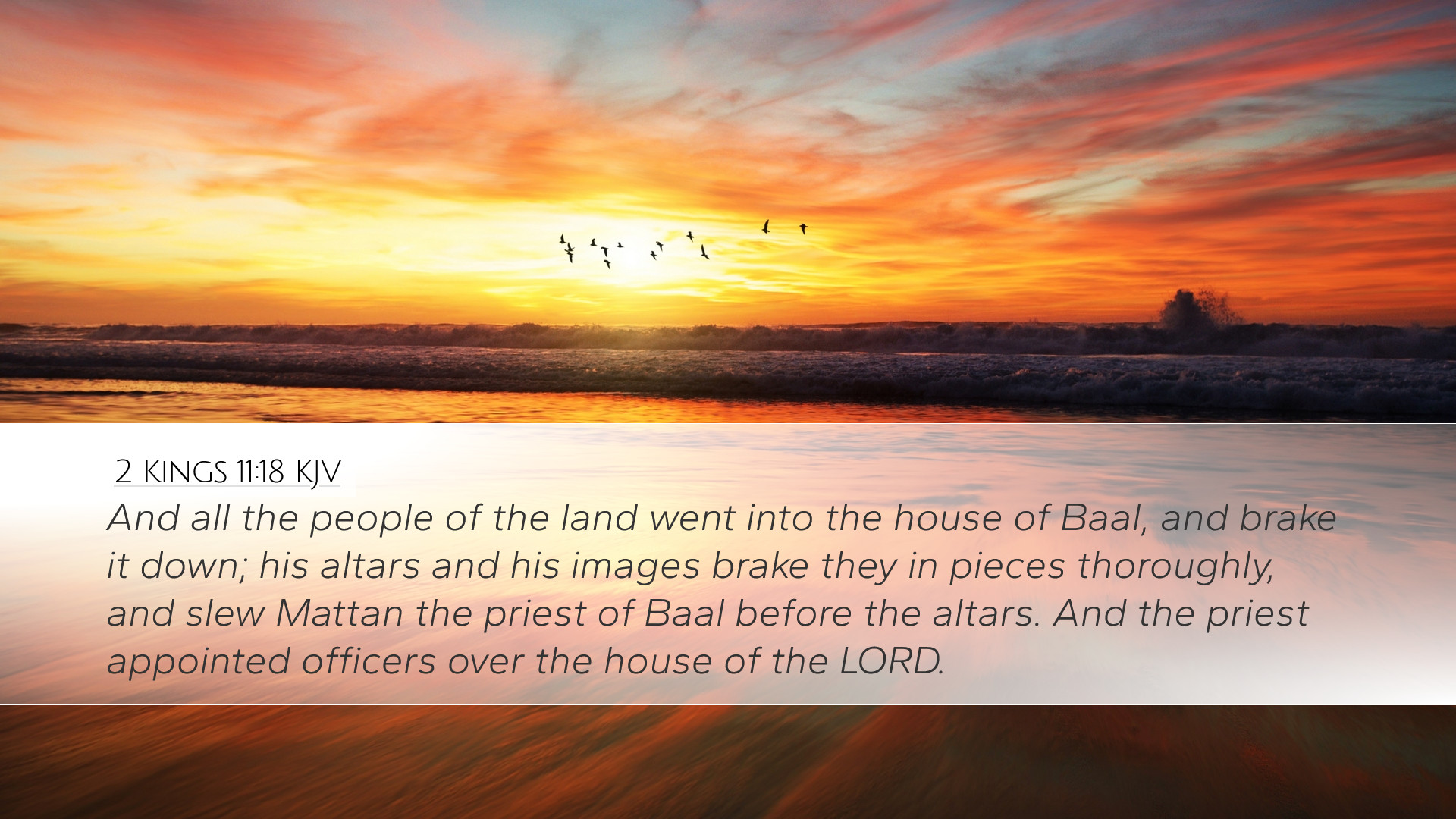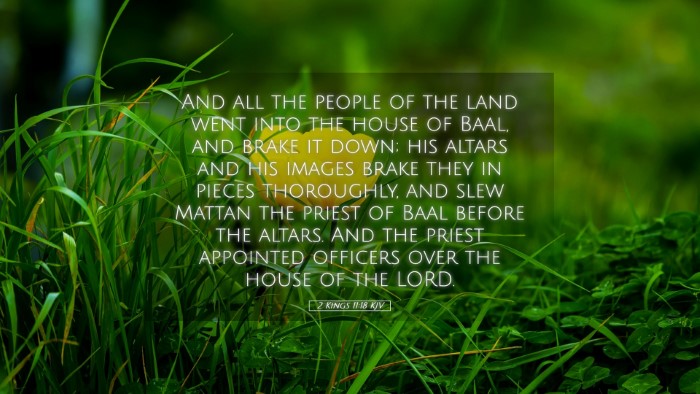Old Testament
Genesis Exodus Leviticus Numbers Deuteronomy Joshua Judges Ruth 1 Samuel 2 Samuel 1 Kings 2 Kings 1 Chronicles 2 Chronicles Ezra Nehemiah Esther Job Psalms Proverbs Ecclesiastes Song of Solomon Isaiah Jeremiah Lamentations Ezekiel Daniel Hosea Joel Amos Obadiah Jonah Micah Nahum Habakkuk Zephaniah Haggai Zechariah Malachi2 Kings 11:18
2 Kings 11:18 KJV
And all the people of the land went into the house of Baal, and brake it down; his altars and his images brake they in pieces thoroughly, and slew Mattan the priest of Baal before the altars. And the priest appointed officers over the house of the LORD.
2 Kings 11:18 Bible Commentary
Commentary on 2 Kings 11:18
Verse Context: 2 Kings 11:18 states, "Then all the people of the land went to the house of Baal, and tore it down; they broke in pieces its altars and images and killed Mattan the priest of Baal before the altars. And they burned the house of Baal." This text captures a decisive moment in Israel's history where the worship of Baal was confronted and dismantled by the God-fearing remnant under the leadership of Jehoiada the high priest.
Historical Background
This event transpires in a turbulent period for Israel, where idolatry had seeped into the hearts of the people due to the influence of Queen Athaliah and her wicked reign. The removal of this pagan worship reflects not only a physical removal of idols but also a profound spiritual renewal spearheaded by Jehoiada, indicating a turning back to the covenant-keeping God of Israel.
Theological Insights
Idolatry and Its Consequences: The worship of Baal was widespread, and its removal signifies the people's recognition of their sin and idolatry. As Matthew Henry notes, the dismantling of Baal’s temple illustrates God’s sovereignty over false gods. The zealous actions of the people demonstrate the power of collective repentance and the importance of tearing down the strongholds of sin.
- Spiritual Implications: Adam Clarke emphasizes that this act not only involved physical destruction but marked a significant turn in the spiritual health of the nation. The eradication of Baal worship was essential for restoring right worship of Yahweh.
- Judgment on Idolatry: The killing of Mattan, the priest of Baal, signifies God’s judgment against false prophets and priests. Albert Barnes notes that bloodshed in divine judgment is a recurring theme throughout Scripture, highlighting that God will not tolerate the worship of any entity above Himself.
Leadership and Covenant Loyalty
Jehoiada's leadership is crucial in this account. His decisive actions guide the nation back to commitment to Yahweh, reflecting the essential role of spiritual leaders in promoting and maintaining faithfulness to God. Jehoiada’s conviction and the resulting movement against Baal worship serve as an example for contemporary leaders and congregations today.
Jehoiada’s Influence
His mobilization of the people reflects strong ecclesiastical authority. As past commentators observe, Jehoiada acts effectively to gain support for his righteous cause. He provides a stark contrast to Athaliah's reign, characterized by treachery and idolatry. This transition from darkness to light emphasizes the need for godly leadership within the church today.
Application for Today
This passage calls contemporary readers to examine their own hearts and communities for remnants of idolatry. Just as Jehoiada led the Israelites to remove foreign altars, modern believers are encouraged to evaluate the influences that draw them away from God. Where are our idols? What must be torn down?
- Collective Responsibility: The people collectively participated in this act, signifying the need for communal accountability in faith practices.
- Destruction of Idols: There is an application in requiring a radical approach to sin. Just as Baal's structures were destroyed, believers need to take practical steps to eliminate sin from their lives.
- Commitment to the True God: The devotion of the people following this incident illustrates what it means to cleanse one's worship practices and reestablish a genuine relationship with God.
Conclusion
2 Kings 11:18 serves as a powerful reminder of the clash between true faith and idolatry. As the people of Israel sought to eradicate Baal, modern Christians too are called to pursue purity in worship and to stand against cultural idols. This momentous occasion in biblical history beckons theologians and scholars to reflect on the deep implications of faithfulness, leadership, and the communal nature of worship. Let the reformation of heart and home be evidenced through a return to the Lord and a cleansing of the idols that seek to claim our attention and affection.


